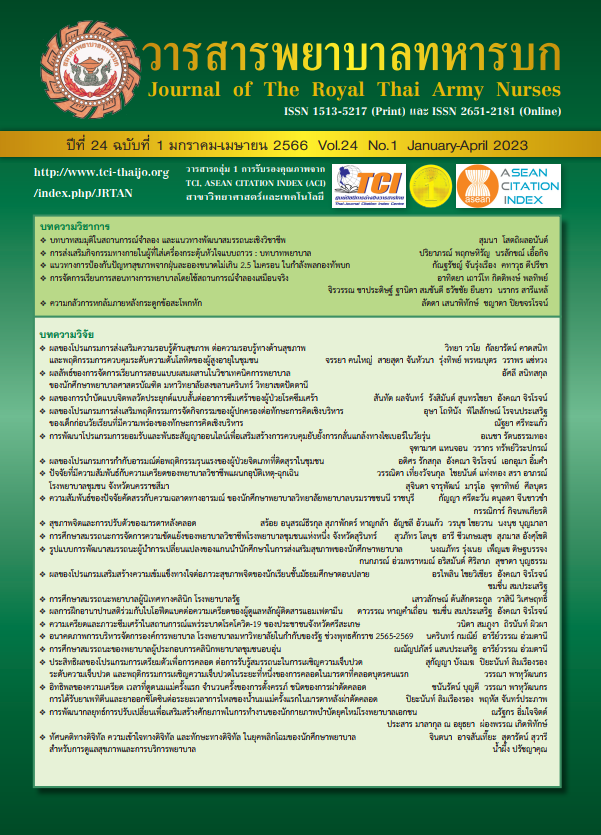The Effect of the Health Promotion Program of Thin Pre-School Children on Nutritional Care Behavior among Caregivers
Keywords:
nutritional status, pre-school children, nutritional care behavior, caregiversAbstract
This study was a quasi-experimental research using a two-group, pretest-posttest design. The purpose of this research aimed to study the effect of the health promotion program of thin pre-school children on nutritional care behavior among caregivers. The subjects of this study were 76 caregivers, aged 20-59 years have roles and duties to take care of food providing for pre-school children. The subjects were randomly assigned to the experimental and control groups, with 38 patients in each group. The experimental group participated in the health promotion program that applied health belief model based on Becker, s health belief model, for 7 sessions, each session took 120 minutes, the control group received routine care. The research instruments consisted of the health promotion program and nutritional care behaviors questionnaire in which the Cronbach, s alpha coefficient was .82. Descriptive statistics and t-test were used to analyze the data. The results of the study were follows.
1) The mean scores for the nutritional care behaviors of the experimental groups after participating
(x̅ = 90.71, SD. = 8.29) in the health promotion program was statistically significantly higher of the mean scores
than before participating (x̅ = 66.24, SD. = 5.814) in the program (t = 15.50, p < .05)
2) The mean scores for the nutritional care behaviors of the experimental groups (x̅ = 90.71, SD. = 8.29) and the control groups (x̅ = 79.42, SD. = 6.62) after participating in the health promotion program was statistically significantly (t = 7.48, p < .05)
Downloads
References
World Health Organization. Child growth standards and the identification of severe malnutrition in infants and children. World Health Organization Geneva Switzerland; 2015.
Unicef, WHO, The World Bank group. Level and Trend in Child Malnutrition. Geneva Switzerland: World Health Organization; 2015.
The National Statistical Office. Monitoring the situation of children and women. Nonthaburi: National Office of Buddhism; 2019. (in Thai)
Venables PH, Raine AL. Poor Nutrition at Age 3 and Schizotypal Personality at Age 23: The Mediating Role of Age 11 Cognitive Functioning. American Journal of Psychiatry. 2012;169(8): 822-30.
Anonjarn K, Odomporn O. The Influence of Health Literacy with Consumption and Exercise Behavior among School-age Children with Overnutrition. Journal of The Royal Thai Army Nurses. 2021; 22(2): 314-26. (in Thai)
Singhasame P, Suwanwaha S, Sarakshetrin A. Nutritional Promotion in Pre-School Children. The Southern College Network Journal of Nursing and Public Health.2017; 4(3) : 226-35. (in Thai)
Sirinam W. Factors influencing nutritional status of Children development centers in Banklang Subdistrict Municipality Sanpatong District, Chiang Mai Province. (thesis). Chaingmai: Ratchaphat Chaingmai University; 2019. (in Thai)
Becker, M.H. The health belief model and personal health behavior. New Jersy: Charls B. Slack; 1974.
Cohen J. Statistical power analysis for the behavioral sciences. 2nd ed. New York. Lawrence Erlbaum Associates; 1988.
Thienphuridej T. A comparative study of Parental factors between thin and normal pre-school children in Warinchamrap District, Ubonratchathani Province. Journal of nursing and health. 2019; 44(3) : 84-95. (In Thai)
Saeyang C, Yunak R, Oba N. Effect of applied health belief model on caregiver, s providing behavior and body weight among underweight early children in Hmong, Journal of nursing and health sciences, 2014;8(1) : 120-29. (In Thai)
Downloads
Published
How to Cite
Issue
Section
License
Copyright (c) 2023 Journal of The Royal Thai Army Nurses

This work is licensed under a Creative Commons Attribution-NonCommercial-NoDerivatives 4.0 International License.
บทความหรือข้อคิดเห็นใดใดที่ปรากฏในวารสารพยาบาลทหารบกเป็นวรรณกรรมของผู้เขียน ซึ่งบรรณาธิการหรือสมาคมพยาบาลทหารบก ไม่จำเป็นต้องเห็นด้วย
บทความที่ได้รับการตีพิมพ์เป็นลิขสิทธิ์ของวารสารพยาบาลทหารบก
The ideas and opinions expressed in the Journal of The Royal Thai Army Nurses are those of the authors and not necessarily those
of the editor or Royal Thai Army Nurses Association.






